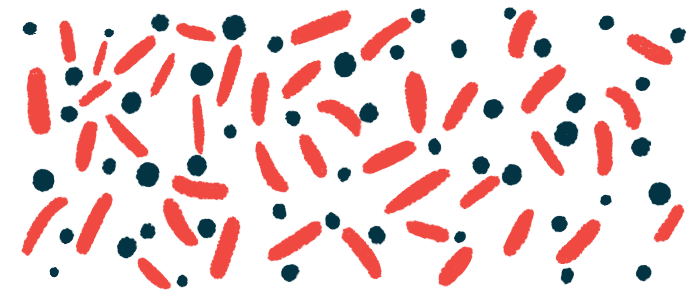Phage therapies found to induce individualized antiviral response
Different types of phages elicit different airway immune activity in CF: Study
Written by |

Phage therapy, a promising strategy for treating antibiotic-resistant lung infections that’s currently in clinical trials, can trigger the release of inflammatory signaling molecules from human lung cells, with different types of phages triggering a different set of signaling molecules.
That’s according to a study, “Lytic bacteriophages induce the secretion of antiviral and proinflammatory cytokines from human respiratory epithelial cells,” published in PLOS Biology.
Bacteriophages — usually abbreviated as just phages — are viruses that are able to infect and kill bacteria. Chronic bacterial infections are a common symptom in people with cystic fibrosis (CF), and researchers have explored using phages as a medicine to combat bacteria in CF lung infections, with promising early results.
‘Phage therapy has seen success in Eastern Europe as an antimicrobial’
“Developed many decades ago, phage therapy has seen success in Eastern Europe as an antimicrobial for difficult-to-treat infections and is increasingly being used in clinical trials and compassionate use cases through Emergency Use Authorizations in the U.S.,” Paula Zamora, PhD, a postdoctoral researcher at Dartmouth College and first author on the study, said in a press release.
While early findings for phage therapy in CF lung infections have been promising, a lot is unknown about this therapeutic strategy. For example, while phages cannot infect human cells, during phage therapy human cells are exposed to high amounts of the viruses. In this study, scientists conducted a series of experiments to answer a key question: how do human lung cells respond to phages?
“Since very high doses of phages are often needed to elicit a therapeutic effect, we wondered, ‘Do the host cells detect these phages, and do they create an inflammatory response that we should be concerned about?’” said Jennifer Bomberger, PhD, senior author of the study and a professor at Dartmouth.
For their experiments, the researchers used human airway cells derived from a person with CF, and then exposed them to a panel of phages that target Pseudomonas aeruginosa, one of the main bacteria that causes chronic lung infections in people with CF. Although all of the phages tested could affect the same bacteria, they varied in other properties (like their physical shape and the specific family of virus).
“The use of phages with different morphologies allowed us to investigate the association between types of phages and their behavior in the airways,” the researchers noted.
Phages led to more cytokines that control inflammation, immune responses
The scientists found phages are able to activate molecular sensors called toll-like receptors, or TLRs, in lung cells. The activation of TLRs triggered the cells to increase their production of cytokines, which are signaling molecules that control inflammation and immune responses. Notably, while there was some overlap, different types of phages elicited different specific cytokine responses from the airway cells.
“Phages with therapeutic potential engage extracellular TLRs and induce an increase in specific antiviral and proinflammatory cytokines,” the researchers concluded. “These responses are specific for each phage, and thus, should be taken into consideration when choosing phages for therapeutic treatment.”
The team noted that, depending on contact, triggering cytokines to activate the immune system might be beneficial if it could help spur immune cells to battle invading bacteria — but it could also be counterproductive as the immune system may in fact dampen the efficacy of phage therapy. More research is needed, but the scientists said these findings underscore the importance of not making generalizations since the details will probably vary phage to phage.
“Our research also indicates that immune responses to phages could be harnessed to improve the effectiveness of phage therapy on an individual basis,” Zamora said. “We hope that our findings will lead to more studies that examine the effects that phages have on the human host.”








